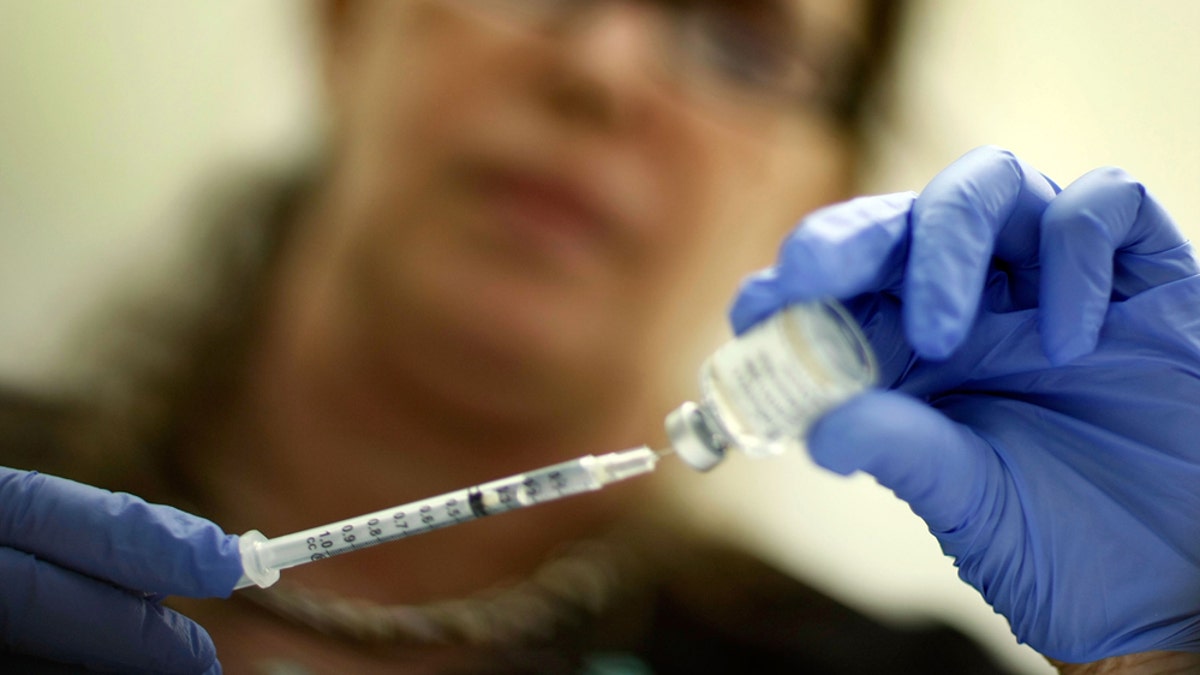
MIAMI - NOVEMBER 03: Marina Spelzini, a registered nurse, measures out an H1N1 vaccine shot at the Miami Dade County Health Department downtown clinic on November 3, 2009 in Miami, Florida. Unlike other parts of the country which are experiencing long lines and shortages of the vaccine, South Florida is not having this problem. The Miami-Dade County Health Department received 195,000 doses of the vaccine but has only given out about 10,100. Broward County has 52,000 doses on hand and has administered about 10,000 doses. (Photo by Joe Raedle/Getty Images) (Getty Images)
Baxter International's seasonal flu vaccine made using quicker cell-based manufacturing methods was at least as effective at preventing flu as conventional vaccines grown in chicken eggs, company researchers said on Tuesday.
They said Baxter's vaccine Preflucel prevented flu in 78.5 percent of people who got the vaccine. That compared to egg-based vaccines, which historically protect 73 percent of people who get the vaccine.
"At 78.5 percent, we certainly would not claim superiority to egg-derived vaccines, but we are at least as protective as vaccines produced by historical manufacturing process involving the use of eggs," said Dr. Noel Barrett of Baxter's Bioscience unit in Austria, whose findings were published in Lancet.
Cell-based vaccines offer a faster, more reliable alternative to vaccines grown in fertilized chicken eggs, a 60-year-old method that can take up to six months to complete and is prone to manufacturing problems that have led to vaccine shortages.
Because the flu strains mutate, vaccine makers must reformulate seasonal flu vaccine every year.
With conventional flu vaccines, the World Health Organization picks the top three flu strains circulating during a flu season that will make up the flu vaccine.
Then they genetically manipulate these to develop strains of the virus that will grow well in eggs, a process that takes about 8 to 10 weeks. Baxter's method skips that step.
"We work with the virus directly isolated from nature, which gives us an 8- to 10-week advantage, which can result in the vaccine being available earlier in the season," Barrett said in a telephone interview.
Flu makers struggled to make a vaccine against H1N1 after it emerged initially in early 2009. By the time it was widely available in late 2009 the pandemic's first wave had passed.
Baxter's seasonal flu vaccine study was conducted in 36 centers in the United States. It involved more than 7,200 healthy adults aged 18 to 49 who were assigned to get the Baxter flu vaccine or a placebo during the 2008-2009 flu season.
Suspected cases of flu were confirmed at labs run by the U.S. Centers for Disease Control and Prevention.
Currently, the United States has contracts with five influenza vaccine makers, Novartis, AstraZeneca unit MedImmune, Sanofi Aventis, GlaxoSmithKline and Australian vaccine maker CSL.
The U.S. government recommends virtually all 330 million Americans get vaccinated.
Barrett said the company is in talks with the FDA about whether the data will be adequate to support licensure in the United States. "We hope within the next month that should be clearer," he said.
Baxter's cell culture vaccine is approved for sale in Austria and the Czech Republic, and Barrett said he expects broader licensure in most European countries by the end of March.
